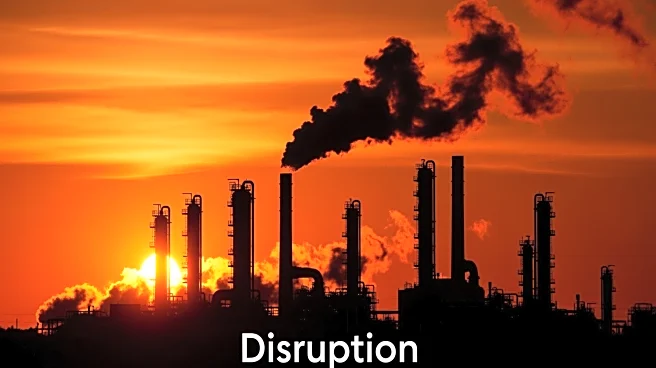What's Happening?
A Ukrainian attack has reportedly halted production at the Volgograd refinery, one of Russia's larger refineries. The primary processing unit, CDU-5, with a daily capacity of 66,700 barrels per day, and a hydrocracker with a capacity of 11,000 tons per day were
damaged during the attack. The plant has been stopped, and CDU-5 was on fire, according to anonymous sources. This development is part of a broader conflict where Russian forces have mounted 220 attacks on Pokrovsk in three days, suffering losses while still holding 314 troops there. Ukrainian units have advanced in Kupiansk, held Volchansk, repelled assaults north of Siversk, and gained ground in Dobropillia.
Why It's Important?
The halt in production at the Volgograd refinery is significant as it disrupts a major source of fuel processing in Russia, potentially affecting the country's energy supply and economic stability. The ongoing conflict and attacks highlight the intense military engagements between Russia and Ukraine, with both sides experiencing strategic gains and losses. The damage to the refinery could exacerbate Russia's logistical challenges in sustaining its military operations, while Ukraine's advances may bolster its position in the conflict. The situation underscores the volatility in the region and the potential for further escalation.
What's Next?
The immediate consequence of the attack is the disruption of fuel processing at the Volgograd refinery, which may lead to shortages and increased pressure on Russia's energy infrastructure. As the conflict continues, both Russia and Ukraine are likely to adjust their military strategies, with Russia potentially seeking to reinforce its positions and Ukraine aiming to capitalize on its recent gains. The international community may respond with increased diplomatic efforts to de-escalate tensions, while monitoring the humanitarian impact on civilians in affected areas.
Beyond the Headlines
The attack on the Volgograd refinery highlights the broader implications of the conflict, including the ethical and legal dimensions of targeting critical infrastructure. The disruption of energy supplies can have long-term effects on regional stability and economic conditions, potentially influencing global energy markets. Additionally, the conflict raises questions about the protection of civilian infrastructure during wartime and the responsibilities of combatants under international law.
















